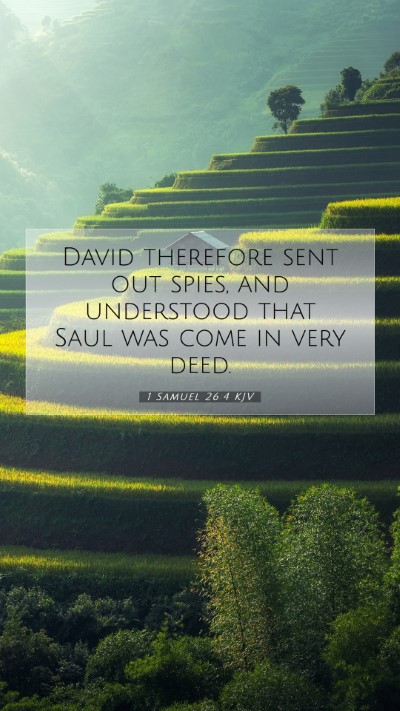Bible Verse Commentary: 1 Samuel 26:4
This passage from 1 Samuel 26:4, which states, "David sent out spies, and learned that Saul had come to seek his life," highlights the ongoing conflict between David and Saul. Through a careful examination of this verse, we find a rich tapestry of themes around leadership, trust, and divine providence expressed in the commentaries of notable scholars.
Overview of the Verse
The context of 1 Samuel 26 depicts a critical moment in David's life as he evades a hostile King Saul, who is conducting a pursuit fueled by jealousy and fear. This scripture presents a crucial insight into David's wisdom and discernment in gathering information about Saul's intentions.
Insights from Public Domain Commentaries
-
Matthew Henry's Commentary:
Matthew Henry emphasizes David's prudence in sending spies to gather intelligence instead of confronting Saul rashly. This demonstrates a well-considered approach to conflict, showcasing that David acted not only as a warrior but as a wise leader. The decision to act with caution is also an illustration of faith in God's protection, reflecting David’s reliance on divine guidance during perilous times.
-
Albert Barnes' Commentary:
Albert Barnes points out that this incident underscores the deeper moral and ethical implications of leadership. Barnes interprets David’s actions as not merely self-preservation but as a reflection of his integrity and respect for the anointed king, even in dire circumstances. This sets a poignant example for leaders today regarding the careful balance between self-defense and respect for authority.
-
Adam Clarke's Commentary:
Adam Clarke adds a layer of historical context, highlighting the implications of David's strategic movements in a politically charged environment. He notes how David's intelligence-gathering not only served his immediate survival but was a testament to God's guidance and providence. The act of sending spies indicates a proactive stance, underlining the importance of wisdom in leadership as well as the recognition of the challenges one faces in their quest for righteousness.
Key Themes and Applications
The themes emerging from 1 Samuel 26:4 utilize the intersection of human ingenuity and divine intervention. David’s actions prompt deep reflection on how we approach challenges in our lives, be it personal struggles or leadership dilemmas.
Trusting in Divine Providence
A central theme is the trust in God’s providence. The reliance on spies may indicate a need for earthly wisdom to navigate difficult situations, yet it must always align with faith in God's overreaching plan. This action serves as a metaphor for how believers should approach modern-day conflicts, seeking both heavenly and earthly wisdom.
The Importance of Wisdom in Leadership
This passage also speaks volumes about the nature of leadership. David's actions are a reminder for leaders to gather insights and make calculated decisions rather than acting impulsively in threatening situations. This provides a practical guideline for today's leaders across all spheres—be it in families, workplaces, or communities.
Respecting Authority
David's interactions with Saul teach us about the delicate balance between self-protection and respect for those in positions of authority. Even when positions of power wield injustice, maintaining integrity while seeking resolution is a key biblical lesson.
Cross References
- 1 Samuel 24:4-7 - David spares Saul's life in a previous confrontation.
- Proverbs 27:12 - The prudent see danger and take refuge, but the simple keep going and pay the penalty.
- Psalms 57:1-3 - A prayer for mercy amidst peril, reflecting David's reliance on God in times of need.
Conclusion
In studying 1 Samuel 26:4, we discover deeper principles that resonate through the ages: the necessity of wisdom, the profound impact of trust in God, and the importance of navigating authority. Through the combined insights from the commentaries, we can better grasp the multifaceted meanings embedded in this scripture, making it applicable to our daily lives and enhancing our biblical understanding.


